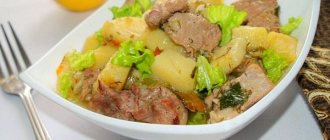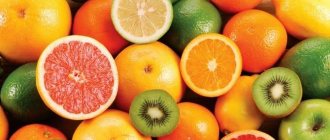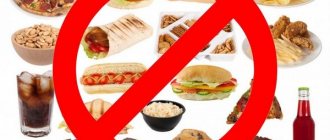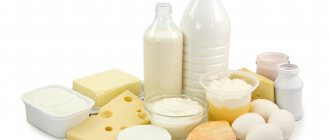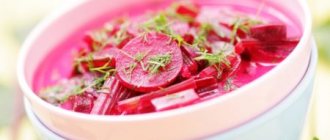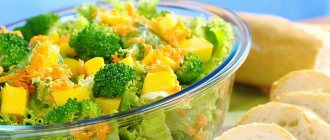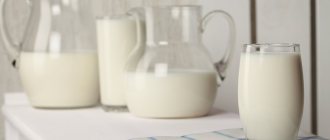What nutritional rules should you follow?
After the patient’s condition has been stabilized, the gastroenterologist will select a diet plan for him, which will be assigned the following tasks:
- unloading the digestive system;
- restoration of gastrointestinal functions;
- acceleration of regeneration processes.
If the patient violates the rules of therapeutic nutrition, this may cause a relapse. While the patient is following a diet, the gastroenterologist can adjust the diet depending on how the patient is feeling. As the symptoms of the pathology disappear, new dishes will be introduced into the patient’s daily diet.
During therapeutic nutrition, the following rules must be observed:
- Products are introduced into the daily diet gradually. If the body reacts normally to them, then the amount can be increased little by little.
- Patients should eat at least 6 times a day.
- After eating food, do not drink liquid.
- Portions should be minimal so as not to overload the stomach. Over time they will increase.
- It is recommended to drink water and other permitted drinks an hour before or after meals.
- The temperature of food and liquid consumed by the patient should vary in the range of 36-40 degrees.
- Before meals, patients should add vitamin supplements to their meals, which are sold in pharmacies in drop or powder form.
General recommendations
The main symptoms of gastroenteritis are diarrhea and vomiting. In order not to provoke new attacks, eating food is strictly contraindicated on the first day from the onset of the disease (and, if necessary, two or even three). This will only lead to more irritation of the gastrointestinal tract. The patient’s body is already clogged with waste products of pathogenic bacteria and toxins, which fasting helps get rid of. During this period, it is very important to provide the patient with a sufficient amount of water - the most ordinary bottled water, without gas, dyes, flavors and similar harmful substances. You can offer the patient a weak decoction of chamomile flowers or weak tea without milk and sugar.
Briefly about the disease
Gastroenteritis is characterized by an inflammatory process of the mucous membrane of the stomach and small intestine. The main cause of development is Reoviridae (rotavirus infection), it enters the human body through household contact or through poorly washed vegetables and fruits. Sometimes the infection spreads to the oral mucosa and larynx. When inflammation occurs in the large intestine, the disease is called gastroenterocolitis.
Symptoms of gastroenteritis are as follows:
- nausea;
- vomiting and diarrhea;
- pain in the abdominal area;
- malaise, weakness.
It is worth noting that the acute, chronic form of the disease is considered quite serious for the health of adults and children. However, with timely implementation of therapeutic measures, the prognosis will be positive.
Contraindications
After recovery, for at least another three weeks, the patient must avoid foods that irritate the mucous membrane of the stomach and intestines:
- Radish;
- Radishes;
- Onions (onion and green);
- Garlic;
- Sweet and hot peppers;
- White and red cabbage;
- Fresh cucumbers;
- Legumes;
- Fruits and berries with a sour taste;
- Mature fermented milk products;
- Rye bread;
- Alcohol and carbonated drinks.
At the end of the recovery period, you should consult your doctor about your future diet. Some products will again become permitted, but alcoholic drinks, gas water and spicy vegetables with a spicy taste are usually banned for several weeks or even months.
What can you include in your diet?
The diet of a patient undergoing treatment for gastroenteritis should contain the following products:
- porridge from soft cereals without salt, which are very boiled and then rubbed through a sieve or crushed in a blender (for example, from rice);
- low-fat varieties of fish and meat (steam treatment is mandatory);
- empty soups (unrich), for example, chicken, meat or vegetable;
- puree made from vegetables or fruits (you can use potatoes, carrots, banana, etc.);
- the consumption of foods containing carbohydrates is not limited;
- crackers (wheat);
- decoctions prepared from medicinal herbs.
Basic principles of diet therapy for gastroenteritis
The success of recovery depends on healthy nutrition. And this applies to various disorders of the digestive system. A strict diet is very important, and no medications or modern methods will cope with the pathology if it is not followed.
Uncontrolled eating is completely unacceptable here. It is through diet that one can overcome the signs of the disease without the help of medications. Caring for the gastrointestinal tract will increase the process of regeneration of damaged organs.
After diagnostic measures, the gastroenterologist establishes a treatment regimen for each person individually. Prescriptions are determined by the form of the disease and the stage of severity of the process.
At initial manifestations, it is important to give up bad habits, stop drinking and smoking, and maintain bed rest. And drinking plenty of fluids will help prevent dehydration, because this is possible with vomiting and diarrhea.
Diet for gastroenteritis is very important, since without following the main rules of therapeutic nutrition, it will be quite difficult to normalize the patient’s condition.
In case of intestinal infection of Proteus etiology, which has become the cause of the development of gastroenteritis, the main tasks of dietary nutrition are:
- relief of the inflammatory process and unpleasant symptoms, which may be nausea, abdominal pain, diarrhea, flatulence, bloating, etc.;
- promoting the regeneration of damaged gastric and intestinal mucosa;
- normalization of the functions of the digestive system;
- reducing the negative impact of a number of food products on the gastrointestinal tract;
- gentle mode.
The most strict diet is for gastroenteritis that occurs in acute form. In the first days after the development of the disease, the patient should completely refuse to eat so as not to further irritate the digestive tract. At the same time, you need to provide the body with enough fluid.
Previously, doctors believed that you should not eat at all on the first day of illness. Nowadays, eating is allowed if there is an appetite (you can’t force feed!), It’s important to just choose the right foods. The purpose of the diet is to create conditions under which the load on the digestive tract is minimized and the inflammatory process is inhibited.
Basic principles of the diet:
- meals for gastroenteritis are frequent, fractional (portions of food and drinks should be made small to avoid attacks of vomiting);
- food should be ground and pureed;
- the temperature of liquid and food should be approximately equal to body temperature;
- In the first days, a constant supply of fluid to the body is necessary (preventing dehydration and removing toxins).
The temperature of liquids and food should be approximately equal to body temperature
The importance of diet for gastrointestinal inflammation
With gastroenteritis, the inner lining of the stomach and small intestine is inflamed, resulting in vomiting and diarrhea, cramping pain, and often due to intoxication, myalgia, headaches, and weakness occur. If the inflammation of the organs is severe, then internal bleeding may begin, which will be clear from the presence of blood in the stool.
Gastroenteritis can also be a chronic disease. The disease can occur in mild, moderate, or severe form. Since in moderate and severe cases the body temperature rises to febrile levels, and there is also vomiting and diarrhea up to 10 times a day, dehydration often occurs.
Dehydration is manifested by dry mouth, dark urine and small amounts of urine, weakness, fever, nausea and vomiting, diarrhea, changes in appearance (circles under the eyes, redness of the skin, pointed chin). A diet for gastroenteritis helps to minimize the aggressive effect on the gastric mucosa, prevent dehydration, and reduce fermentation in the intestines.
What are the recommendations for nutrition during illness?
Often when treating a disease, doctors recommend not eating for 24 hours after the onset of symptoms. Only by emptying the stomach (vomiting) and intestines (diarrhea) will the body cleanse itself of toxins or the virus that caused the pathology. Since a lot of liquid comes out, it needs to be constantly replenished by drinking large amounts of liquid.
Water or herbal tea should be warm (15–55 ⁰C) and should be drunk in small sips over a long period of time to avoid gagging. A straw will help you drink little by little. In case of severe diarrhea and vomiting, it is advisable to take a rehydration solution, which you can buy at a pharmacy or prepare yourself (add a teaspoon of sugar and three-quarters of a small spoon of salt to 200 ml of orange juice).
Some experts believe that if an appetite appears, then you should not starve the patient, but you need to give him food that will not irritate either mechanically or chemically the gastric mucosa. Basic recommendations for diet for gastroenteritis:
- split meals (every 3 hours);
- dishes should be steamed, baked or boiled;
- you should not eat something very cold or, conversely, hot (so as not to irritate the mucous membranes);
- products should be moderately gentle.
What should not be in a patient’s diet?
When drawing up a menu, the patient must give up all harmful foods that can worsen his well-being and slow down the healing process.
For this category of patients, the following restrictions apply:
- Foods high in organic acids and fiber should be excluded. They are poorly digested, so they overload the stomach. They can also act as irritants for the mucous membrane, against which an inflammatory process will develop.
- Dairy products can cause disruption of bowel movements (diarrhea resumes).
- Any rich pastries, chocolate, confectionery, and white sugar are completely excluded from the diet.
- It is forbidden to eat fried, smoked, spicy, canned, fatty and salty foods.
- A taboo is placed on coffee, cocoa, strong black tea, kvass, alcohol-containing drinks, sweet soda, spices, marinades, sauces and all kinds of seasonings.
- Fresh baked goods provoke fermentation processes, so they should not be on the menu.
- You should not use mushrooms, legumes, or pickles in the process of preparing dietary dishes.
What is gastroenteritis
The disease itself is characterized by the development of inflammation of the gastric mucosa and small intestine. The main cause of the disease is considered to be a rotovirus infection Reoviridae, which can enter the body through household contacts, through unwashed fruits and vegetables, and even through water, especially if it is from the tap. In some cases, infection spreads to the oral mucosa and pharynx. If the inflammatory process affects the large intestine, the disease is called gastroenterocolitis.
In medicine, acute and chronic gastroenteritis are distinguished, and colloquially the disease is called stomach flu or “dirty hands disease.” It is quite possible to reduce the likelihood of infection if you try not to neglect the rules of hygiene.
Among the main symptoms of the disease are:
- nausea accompanied by bouts of vomiting;
- bowel dysfunction - diarrhea;
- the occurrence of acute pain in the abdominal area;
- general weakness.
It is worth noting that both acute and chronic gastroenteritis are potentially dangerous to the health of people, including children. The highest incidence of gastroenteritis is observed in underdeveloped countries with a low level of social development. And despite the fact that the disease is quite common, today, thanks to modern treatment methods, the mortality rate from it has literally decreased significantly. And besides, if treatment is started in a timely manner, then after it the prognosis appears quite favorable and one can count on a complete recovery.
General principles of the prescribed diet
Nutrition for gastroenteritis of various forms must coincide with the combined standards:
- do not produce irritating, chemical, mechanical effects on the gastrointestinal tract;
- protect the walls of the digestive tract with an enveloping structure;
- provide the body with all the necessary beneficial components, vitamins, minerals;
- do not overload the digestive tract;
- Follow the rules of hygiene: wash vegetables and fruits thoroughly, drink only purified water.
The above recommendations can be followed both by the correct selection of products and their preparation. In the first and second weeks after the onset of symptoms of the pathology, you should not eat fried or baked foods. It is good to take crushed food, puree or well-boiled food.
A diet for gastroenteritis in children should be carefully selected, which a doctor will help you create. You should prepare the most natural dishes possible, preferably single-ingredient ones. Various sweets and sugar should be excluded altogether.
You need to eat warm foods (36-39°C), hot or cold foods will irritate the gastrointestinal mucosa. You should eat often, 5-6 times a day, but in small portions. This regimen will help prevent the formation of vomiting at the first stage of development, and due to the restoration of intestinal motility, intestinal motility will work more energetically.
Authorized Products
Usually, for gastroenteritis, doctors adhere to traditional methods and prescribe diet No. 4:
- All products are steamed.
- Foods that cause fermentation are excluded from the diet.
- The menu contains a minimum of carbohydrates and fats.
A meager diet is not considered the norm for an adult - after a few days (at the discretion of the doctor), they gradually switch to more varied meals.
Vegetable soup with brisket
Allowed foods in the diet when prescribing diet No. 4:
- soups with low-fat broth, it is possible to add cereals to taste (rice, pearl barley, peas, semolina);
- homemade crackers without spices;
- lean meat and poultry (boiled cutlets, meatballs with added rice);
- river fish (sea fatty) - steamed;
- cottage cheese, sour cream, milk, Varenets;
- eggs (boiled or steam omelet);
- cereals that are boiled in water (buckwheat, oatmeal, rice);
- vegetables (only boiled, for example, in soup);
- drinks: green tea, black coffee or cocoa, fruit juices (except plums, grapes, apricots);
- mashed raw pears, apples.
For gastroenteritis in adults, meals must be divided, 5–6 times a day, portion sizes are small. It is unacceptable to eat cold food: dishes should be warm, but not hot (to avoid thermal burns of internal organs).
Diet for acute gastroenteritis
Acute gastroenteritis is more difficult to tolerate and requires a special diet. Acute forms are treated by a doctor prescribing diet No. 4B, which differs from standard table No. 4 by prohibiting the consumption of soups with vegetables and cereals. On a diet for acute gastroenteritis, you should not drink cocoa and coffee.
During the rehabilitation period, the doctor transfers the patient to diet No. 4B - a transition from strict diets to usual food. The menu is softer, allowing you to eat different foods.
Children's medical nutrition
https://www.youtube.com/watch?v=F8fiDaNXIBY
After stopping the attack (usually this process takes 2-3 days, during which therapeutic fasting is carried out), the patient can prepare the following dishes:
- Potato or carrot puree.
- Cream soups.
- Liquid mucous porridge.
- Steam cutlets, meatballs, as well as portioned pieces of fish and meat.
- Fermented milk products (low-fat).
- Baked apples.
- Hard-boiled eggs.
- Fish or meat broths.
- Kissels, jelly.
- Semolina porridge or pudding.
- You can consume no more than 10g of butter and 250g of white crackers per day.
- Diet after major gastric ulcer surgery
- Diet for exacerbation of stomach ulcers
- The benefits and harms of fermented baked milk for gastritis with high acidity
In children, this form of pathology in most cases occurs in an acute form. Parents must follow the following recommendations from gastroenterologists when creating a menu.
Young patients are allowed to include in their diet:
- Fresh bananas.
- Lean varieties of fish, poultry and meat (for example, rabbit, turkey, veal). After cooking, it should be ground or made into pates from the meat.
- Fruit puree (you can use pears, apples).
- Fresh vegetables.
- Porridges made from soft cereals (you can use buckwheat, brown or white rice).
It is prohibited to feed children the following foods:
- Any fatty and fried foods (meat, dairy products, etc.).
- Carbonated sweet drinks.
- Spicy, spicy, salty and smoked food.
- Packaged juices.
- Products containing gelatin.
- Fast food and instant products.
If the baby is breastfed, then his mother does not need to seriously limit herself in anything. In the case when the pathological process has developed due to the baby’s individual intolerance to any product present in her diet, it is immediately excluded.
Moms need to adhere to the following recommendations:
- after the first signs of gastroenteritis appear, the baby needs to be put to the breast more often;
- if there is a danger of dehydration, then the child should be switched to additional complementary foods (or he should be given water);
- in advanced cases, you need to give special solutions prescribed by your doctor;
- if an infant is fed infant formula, it should not be diluted with water (food must be given separately from liquid);
- in the case where gastroenteritis developed while transferring the baby to artificial nutrition, you should briefly switch back to breastfeeding.
Gastroenterologists give the following recommendations regarding nutritional rules for children over one year old (who already eat regular food):
- All juices and sweet drinks are excluded from the diet. The baby is transferred to purified water.
- It is prohibited to introduce new foods into the diet; even those dishes that were introduced no more than a week ago should be excluded from the menu.
- Increase the number of meals (at least 6 times a day), but you need to reduce their nutritional value.
- You can prepare the following dishes: boiled vegetables, apple puree, pasta, turkey fillet meatballs, steamed veal or rabbit, baby cookies, buckwheat porridge, fresh cabbage salad, etc.
- In addition to clean water, you can give your baby low-fat kefir in small quantities.
As a rule, gastroenteritis in children occurs in an acute form. In such a state, the diet for a child allows the consumption of the following products:
- fresh bananas;
- baked vegetables;
- fruit or vegetable puree;
- boiled lean meat and grated fish (you can cook steamed cutlets, soups with meatballs);
- apple casseroles with honey;
- green tea.
In turn, you should not give children with gastroenteritis dairy products, fatty meats, sweets and glazed cheeses.
Diet for gastroenteritis in breastfed children is inextricably linked with the mother’s nutrition. If a pathological process occurs in a child due to individual tolerance of any product in a woman’s diet, it should be immediately excluded.
Also, nursing mothers should know about the following:
- if the baby uses baby formula, it must not be diluted with unboiled water;
- if there is an increased risk of dehydration, the baby should be switched to additional complementary foods (you can just give water from a bottle);
- when symptoms of the disease and increased anxiety appear, the baby should be put to the breast more often;
- If gastroenteritis occurs during the transition of the baby to artificial formula, you should temporarily return to breastfeeding.
What can you eat if you have gastroduodenitis?
In case of gastroenteritis, the diet should be strictly followed. Only a specialist can give all the recommendations on therapeutic nutrition and tell you what you can eat with this disease.
The basis of the diet should be only safe foods that do not injure the mucous membranes and do not provoke an increased secretion of hydrochloric acid. Thus, you can only eat sparing food.
Authorized Products
The patient needs to be fed when he wants: he must consume as much food as his body requires. A day after the onset of the disease, you can include other foods and dishes prepared from them in your diet. Eating for gastroenteritis is allowed:
- cereals: buckwheat, rice, rolled oats, semolina;
- boiled eggs;
- lean fish, meat;
- broth from chicken, vegetables;
- boiled vegetables;
- dried bread, biscuits.
For drinks, it is recommended to drink weak tea, a herbal decoction of rose hips, dried fruit compote, and still medicinal mineral water.
Advice! As a fruit, you can eat ripe banana. It helps restore electrolyte balance, speed up the process of restoring digestion and remove harmful waste products of pathogenic microorganisms from the body.
Allowed dishes
A patient suffering from gastroenteritis can eat dishes prepared from products from the approved list. After the attacks stop (approximately 2-3 days), the following dishes are included in the diet:
- porridge from semolina, rice, oatmeal or buckwheat with water;
- slimy soups (vegetable or chicken) with the addition of vermicelli;
- steamed meatballs or cutlets from lean meat (chicken, rabbit, veal);
- boiled fish;
- vegetable puree (potato, carrot);
- steam omelette;
- fish, meat broth;
- jelly, fruit jelly, steam pudding;
- cottage cheese casserole;
- baked apples, pears.
This is not a complete list of dishes that can be consumed with gastroenteritis. The attending physician should be familiar with the detailed list. We should not forget that food must be heated to a temperature of 30-40 degrees before consumption.
Recommended menu
A little later, when a person’s condition improves, the menu for gastroenteritis may consist of:
- vegetable chicken broth (starting from 3 days);
- rice water, porridge;
- baked apples;
- vegetables boiled or pureed.
On day 5, the diet for gastroenteritis in adults increases through:
- buckwheat, semolina, millet porridge;
- meatballs, steamed minced chicken cutlets;
- herbal teas (rosehip infusion), apple, pear infusions.
https://www.youtube.com/watch?v=GsLGYcuxnag
In the first 14 days, do not eat salty foods; you can add a small amount of vegetable oil to them. Also exclude any spices or seasonings (red, black pepper, dill, cinnamon).
Fermented milk products with a low fat content will help replenish the body with the necessary proteins and minerals (it is recommended to eat homemade yogurt, kefir, biolact). However, you cannot use sour cream, sour cottage cheese, or cheese. Drink plenty of fluids throughout the day, at least 2 liters.
Delicious recipes
Make chicken broth from the breast or leg, skimming the fat periodically. Take a glass of liquid, add up to half a liter of boiled water and bring to a boil. Pour sorted and very well washed rice cereal (5 tablespoons) into the boiling liquid, wait until it boils again, and leave to simmer over low heat for half an hour. When the cereal is properly boiled, place it on a sieve and grind thoroughly, then return it to the pan, lightly salt it and let it boil a third time. When serving, season with a small piece of butter.
Features of dietary nutrition in case of illness
Patients with gastroenteritis are conventionally divided into three groups:
- infants;
- children from one year old;
- adults.
Division is used to take into account the characteristics of intestinal functioning at different ages.
For babies
Infants have reduced immunity and weaker body defense mechanisms against inflammation compared to adults.
Dehydration should not be allowed. If sick, provide the child with a sufficient amount of fluid during the day. Diluting food is prohibited - the risk of malnutrition is high. They try to reduce the amount of salt in the diet, which contributes to dehydration.
For children from one year old
Feeding the baby
The diet strategy is not very strict - they use ready-made baby purees. You should increase your water intake to avoid dehydration. Otherwise, they maintain their usual diet with the exception of fatty, sweet and spicy foods, which can provoke a new round of inflammation.
For adults
Adults can eat a more varied diet with gastroenteritis compared to children. But adults tolerate milk consumption worse. The diet for adults excludes eating fried, spicy, sweet, fatty foods, smoking and drinking alcohol.
Video
Dietary nutrition for diseases of the gastrointestinal tract is an important component of the recovery process. The disease seriously damages the internal mucous membrane of the internal organs, and both adults and small children adhere to the diet for a speedy recovery. But when creating a diet, it is worth knowing the nutritional rules and permitted foods.
The most important thing is that the diet for gastroenteritis is agreed with the attending physician. The patient can begin to eat when the symptoms of the disease subside: nausea and vomiting. As a rule, diarrhea does not affect the start of food intake. It is worth noting that during the period while the patient is bothered by vomiting, only liquid is given. Allowed: water, herbal decoction. They are heated to a temperature of 36.6 degrees. You should drink in small sips, often. This way, moisture can be absorbed into the body faster and help eliminate toxic substances and reduce the level of poisoning.
Compliance with dietary nutrition is a strict rule, violation of which leads to the return of symptoms of the disease. Permitted products are introduced gradually, over a period of two days. During this time, it becomes clear whether this food is suitable for the patient or not.
What is forbidden to eat
Fatty, fried and spicy foods negatively affect the organs of the gastrointestinal tract during illness: the table for gastroenteritis excludes soups that are cooked in fatty broth, hot spices and other additives until complete recovery and permission for use by a doctor.
Any pastries, pancakes, pancakes contain a large amount of carbohydrates and are excluded from the diet. Fresh fruits are a source of fermentation in the intestines, so their consumption is unacceptable. Carbonated drinks, cold water, fast food items and fruit juices are harmful. Adults are required to give up bad habits: smoking and drinking alcohol.
What you can and cannot drink while sick
If you have gastroenteritis, drinking any alcoholic beverages, including beer and kvass, is prohibited. You will have to give up strong tea, coffee and even cocoa for a while, not to mention chocolate. All carbonated drinks, including mineral water, are prohibited without exception.
What is allowed?
- A variety of jelly - fruit, berry, milk;
- Non-concentrated fresh fruit compotes;
- Drinking yoghurts and skim milk;
- Still mineral water – as prescribed by a doctor;
- Filtered and melt water - at least 1.5-2 liters per day.
All drinks must be either room temperature or lukewarm. Too hot, as well as very cold, are harmful and even dangerous during the acute period of the disease.


